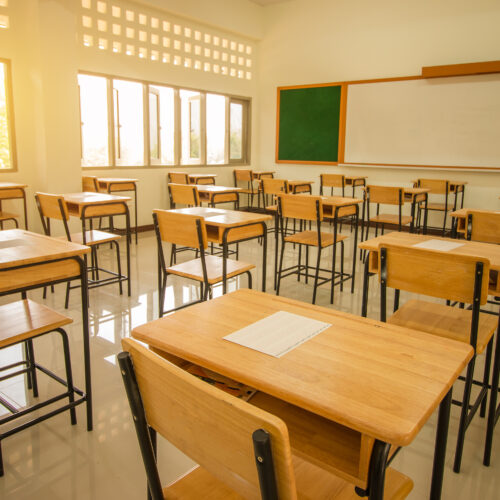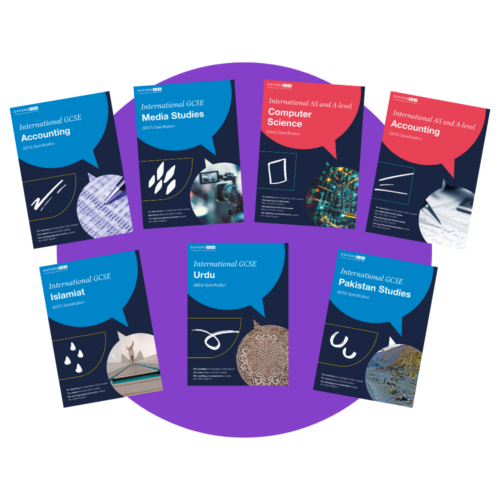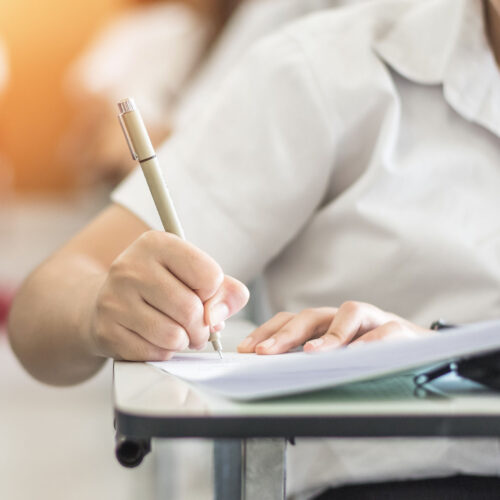OxfordAQA has set regulations for schools that enter students for general qualifications.
Regulations
OxfordAQA’s general regulations:
- are re-issued each academic year
- set out the key administrative requirements
- reference the conduct of exams and special arrangements for individuals with particular requirements
- require compliance with OxfordAQA’s Code of Conduct, including ethical practices.
Please see the General regulations and terms and conditions for approved centres document.
Please see the Conflict of interest guidance (PDF) document.
Malpractice policies
You must have a secure storage area where you can store confidential exam materials such as question papers, answer booklets and supplementary booklets and sheets. See the requirements in JCQ’s ICE document (external link).
- Please notify us immediately by emailing [email protected] if a parcel or one of the packets has been opened during transit and therefore there may have been a breach of security.
- Please also tell us if material has been significantly damaged in transit or upon opening.
- Read our Malpractice document (PDF) for more information on making an allegation and whistleblowing.
- Breach of security
- Deception
- Improper assistance to students
- Failure to co-operate with an investigation
- Maladministration
- Student malpractice
The following examples are the most common malpractice and maladministration issues that are reported to our Exams Integrity team:
Mobile phones:
In the May/June 2022 exam series, the biggest malpractice issue was students having a mobile phone on them in the exam. Please remember that just having a mobile phone in their possession, even if they do not use it, will lead to a total loss of marks for a student. Using or attempting to use a phone will lead to disqualification from the whole qualification. Please make sure all your students know about the serious penalties that come with having a phone with them in the exam.
Watches:
Since the 2021/22 academic year, students are no longer allowed to have any type of watch in their possession during an exam – this includes smart watches, digital watches and traditional analogue watches. As with the mobile phone rule, please ensure your students are aware of this.
Handing out the incorrect paper/tier:
Please ensure that you and your invigilators double check that students have been given the correct paper.
Incorrect timings displayed:
Please ask your invigilators to check that they have displayed the correct start and finish times for the papers being sat. As a reminder, all OxfordAQA exams have a starting time of 7.00AM UK time.
Secure period not observed:
Do not allow students to leave before the secure period ends and ensure that they are given the full allotted time for their paper.
Not reading the instructions on the question papers:
Please remind your invigilators to read this thoroughly for every exam they oversee.
Issues with multiple papers:
Some OxfordAQA exams require multiple papers to be handed out at the same time. Please make sure this information is made clear to invigilators before they hand out papers to ensure all students receive all the required materials for an exam.
Invigilators using mobile phones:
Please make sure that your invigilators are aware that they can only use a mobile phone in an exam room for the sole purpose of getting help and they should make sure that it is always on silent.
Access arrangements issues:
Examples of these include providing too much or not enough extra time, using a scribe when the student is only entitled to a reader, and readers or scribes prompting students.
Fake exam material on social media:
We have seen a rise in the numbers of images of counterfeit examination materials online, attempting to extort money from students. We monitor social media platforms and make contact to have posts removed. It is crucial your students know that attempting to access exam materials in advance of an exam is an offence which can result in a loss of marks or disqualification.
If you or your students have seen or been offered any materials advertised as OxfordAQA exam materials, please let us know by emailing our Exams Integrity team.
We’ll work with you to support you and help avoid the type of scenarios outlined above. However, if something untoward happens, you must let us know. Failure to report malpractice is malpractice in itself. You can email us with any concerns.
We adhere to the Joint Council for Qualifications (JCQ) guidance and policies on malpractice and schools should use their standard forms when reporting malpractice. Please remember:
- if you suspect malpractice
- if you see malpractice
- if you receive a report of malpractice
- if you receive an allegation of malpractice
You must let us know by:
- using a JCQ M1 form to report student malpractice
- using a JCQ M2 form to report school or staff malpractice.
Safeguarding policy guidance
Safeguarding is at the foundation of OxfordAQA’s work, and we are committed to the welfare of everyone we work with and serve – particularly children and young people.
Safeguarding means protecting people’s health and wellbeing, alongside ensuring they can live free from harm, abuse and neglect. Everyone who works for or on behalf of OxfordAQA, such as staff, associates or partners, has a responsibility for support the care and protection of children and adults at risk of abuse and exploitation.
OxfordAQA is committed to helping students successfully progress to their next stage of education or employment. If students are struggling, we believe they should be offered support to help meet their needs.
Every year, students write or draw material in their exam papers which raise concerns with our examiners regarding their safety or wellbeing. When this happens, our examiners will raise these concerns with our Safeguarding Lead who will contact the relevant school so they can speak to the student and offer support if needed.
In this way, OxfordAQA can help young people in distress who may feel the only way they can ask for help is through writing in their exam paper.
We ensure our examiners are trained and alert to pick up any issues, and we will work swiftly to pass any concerns to you promptly.
In return, we ask that you take the matter forward in line with your internal safeguarding policy and relevant local guidance or legislation.
In order to fulfil our commitment to each other, OxfordAQA asks that you provide a copy of your school’s safeguarding policy during the centre approval process.
OxfordAQA does not intend to tell schools how they should manage safeguarding, nor does it endorse or approve policies that are provided to us. However, we do need to seek assurance that any school we approve has:
- A designated person to contact about safeguarding matters, with clear contact details provided.
- A process to respond to any safeguarding concern raised.
- Aligned this process with local legislation or guidance.
- Made locally-appropriate checks on any staff it has employed.
- A process to respond to any safeguarding concerns raised about its staff members.
Your school’s safeguarding policy must address these five points. This gives us the confidence that the schools we approve view the safeguarding of their students with the same high value that we do at OxfordAQA, and that if a concern arises we can refer this to the school, safe in the knowledge it will be dealt with swiftly and appropriately.
Please view our Safeguarding FAQs for more information regarding OxfordAQA’s safeguarding policy.



